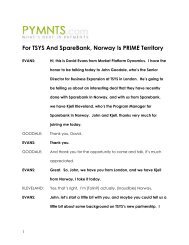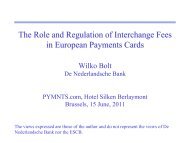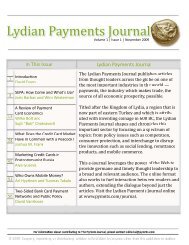Two-Sided Market - PYMNTS.com
Two-Sided Market - PYMNTS.com
Two-Sided Market - PYMNTS.com
You also want an ePaper? Increase the reach of your titles
YUMPU automatically turns print PDFs into web optimized ePapers that Google loves.
CHAPTER EIGHT<br />
The online Advertising Industry: Economics, Evolution, and Privacy<br />
CHAPTER NINE<br />
9 TABLE OF CONTENTS<br />
Part Three<br />
CHAPTER SEVEN<br />
Economics of the online Advertising Industry<br />
Abstract:<br />
Online advertising has grown rapidly and accounts for about 7% of US advertising spending. It is projected to increase<br />
sharply as more consumers spend time online on their personal <strong>com</strong>puters and as additional devices such as mobile<br />
phones and televisions are connected to the web. This article describes how the online advertising industry works. The<br />
industry is populated by a number of multisided platforms that singly or in <strong>com</strong>bination facilitate connecting advertisers<br />
to viewers. Search-based advertising platforms, the most well developed of these, has several interesting economic<br />
features that result from the <strong>com</strong>bination of keyword bidding by advertisers and single-homing.<br />
Abstract:<br />
Online advertising accounts for almost 9 percent of all advertising in the United States. This share is expected to<br />
increase as more media is consumed over the internet and as more advertisers shift spending to online technologies.<br />
The expansion of internet-based advertising is transforming the advertising business by providing more efficient<br />
methods of matching advertisers and consumers and is transforming the media business by providing a source of<br />
revenue for online media firms that <strong>com</strong>pete with traditional media firms. The precipitous decline of the newspaper<br />
industry is one manifestation of the symbiotic relationship between online content and online advertising. Onlineadvertising<br />
is provided by a series of interlocking multi-sided platforms (also known as two-sided markets) that facilitate<br />
the matching of advertisers and consumers. These intermediaries increasingly make use of detailed individual data,<br />
predictive methods, and matching algorithms to create more efficient matches between consumers and advertisers.<br />
Some of their methods raise public policy issues that require balancing providing consumers more valuable advertising<br />
against the possible loss of valuable privacy.<br />
Web Economy, <strong>Two</strong>-<strong>Sided</strong> <strong>Market</strong>s, and Competition Policy<br />
Abstract:<br />
The web economy has grown rapidly in the last decade. Online businesses have several key features that are<br />
important for understanding the pro-<strong>com</strong>petitive and anti-<strong>com</strong>petitive strategies they may engage in. The two-sided<br />
markets literature helps elucidate many of these strategies. It also provides guidance for the antitrust analysis of market<br />
definition and exclusionary practices for web-based businesses.<br />
CHAPTER TEN<br />
Antitrust Issues raised by the Emerging Global Internet Economy<br />
Abstract:<br />
Web-based businesses are increasingly the subject of antitrust concerns. Plaintiffs in the United States have sued<br />
eBay for tying its online payments service to its transaction service. Multiple jurisdictions in the European Community<br />
have claimed that Apple has violated the <strong>com</strong>petition laws by limiting the ability of its music player to play music<br />
from <strong>com</strong>peting music stores and limiting the ability of <strong>com</strong>peting music players to play music purchased from its<br />
music stores. During 2007, although the U.S. Federal Trade Commission decided not to block Google’s acquisition<br />
of DoubleClick after a lengthy investigation, it expressed its intent to “closely watch these markets” involved in online<br />
advertising. The web economy poses two major challenges to <strong>com</strong>petition authorities. The law and economics for<br />
analyzing the multi-sided platforms that dominate the internet sector is not well developed. At the same time the<br />
web-economy is evolving very rapidly and in ways that are sure to result in antitrust <strong>com</strong>plaints and investigations.<br />
Competition authorities and courts will need to exercise great care in balancing the protection of consumers from<br />
anti<strong>com</strong>petitive behavior against causing harm from interfering in <strong>com</strong>plex businesses that are both rapidly moving and<br />
not fully understood.<br />
WEB BASEd PlATforMS








